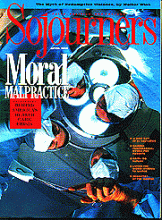As this is written, the media controversy surrounding Oliver Stone's film JFK is reaching a fever pitch. Both major newsmags, The Washington Post, ABC's PrimeTime Live, and Dan Rather himself have all dumped their heaviest artillery fire upon Stone's political mystery tale about the killing of President John F. Kennedy. As they have been since 1963, the corporate media are now unanimous in their unquestioning endorsement of the official story of Kennedy's death--lone nut, magic bullet, and all.
Stone, the wise ones say, is trafficking in half-truths and distortions. They say he's defaming the character of people--Clay Shaw and Lyndon Johnson, for starters--who are not alive to defend themselves. He's mixing up fictional inventions and known facts toward sinister, if not treasonous, ends.
Worst of all, Stone's critics say, he is "rewriting history." But, as any honest scholar or researcher would tell you, sometimes history needs to be rewritten. Sometimes official history is just a cover story, the alibi of criminals in power. For decades the majority of the American people have suspected that the official story of Kennedy's death was just that.
It is at least amusing that a media establishment which, for most of the 1980s, unquestioningly transmitted the fantasy-laden vision of a Hollywood president, is now trying to turn a filmmaker's every dramatic condensation or telescoping of characters into a deliberate deception. But the Big Boys are confused, or hopelessly media illiterate.
To spell it out: Oliver Stone was making a movie. He's an artist. Michael Deaver, the image-monger of the Reagan White House, was a liar.
Read the Full Article

